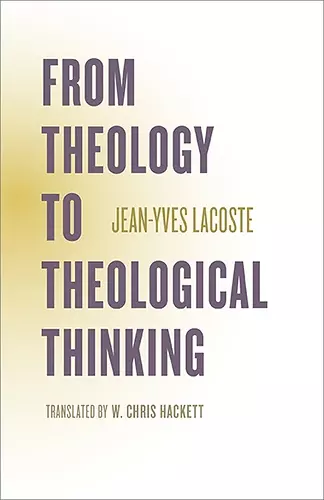From Theology to Theological Thinking
Jean-Yves Lacoste author Jeffrey Bloechl author W Chris Hackett translator
Format:Paperback
Publisher:University of Virginia Press
Published:31st Oct '23
Currently unavailable, and unfortunately no date known when it will be back

Christian philosophy" is commonly regarded as an oxymoron, philosophy being thought incompatible with the assumptions and conclusions required by religious faith. According to this way of thinking, philosophy and theology must forever remain distinct.
In From Theology to Theological Thinking, Jean-Yves Lacoste takes a different approach. Stepping back from contemporary philosophical concerns, Lacoste—a leading figure in the philosophy of religion—looks at the relationship between philosophy and theology from the standpoint of the history of ideas. He notes in particular that theology and philosophy were not considered separate realms until the high Middle Ages, this distinction being a hallmark of the modern era that is coming to an end. Lacoste argues that the intellectual task before us now is to work in the frontier region between or beyond these domains, work he identifies as "the task of thinking."
With this argument, Lacoste resets our understanding of Western Christian thought, contending that a new way of thinking that is at once philosophical and theological will be the lasting discourse of Christianity.
Few books called 'subversive' are so, and fewer still would-be subversive books are also lucid, scholarly, and rigorous. But this most excellent short work by Jean-Yves Lacoste is genuinely subversive, and in part because it possesses these three attributes. The subversion consists in the demolition of any supposed boundary between theology and philosophy: a division unknown to antiquity and much of the Middle Ages, and meaningless after the work of Hegel, Schelling, and Kierkegaard. Theology is not 'regional' -- rather it contests the philosophic logos itself by proclaiming that it is the rational word of Creation and of the crucified God-Man. To be true to itself it must take thinking to the limits and beyond, while remaining conjoined to the work of prayer. Yet the latter stipulation is in Lacoste no pious condemnation of 'secular' philosophy, for he hints that to think at all is in some sense already to pray. The implications of Lacoste's subversion are immense. It helps to explain how today theology is suddenly everywhere, yet also in an extreme institutional crisis. Moreover, it begins to point a way out. None of our existing faculty boundaries make any sense for theologians; instead, what they need is a new academic practice combining theology, philosophy, and the history of religions (implicitly crucial in this book), alongside an encouragement of spiritual formation. The question then, after Lacoste, is what sort of institutional innovations would provide the necessary carapace?
Discerning readers of modern European philosophy know that Jean-Yves Lacoste is a thinker as elegant as he is incisive, as knowledgeable as he is inventive. In these remarkable lectures, we encounter Lacoste not in his usual mode as phenomenologist but as a historian of ideas. Readers will find his sustained revision of Christian history, in which theology plays second fiddle to philosophy, at once insouciant and bracing. - Kevin Hart, University of Virginia
ISBN: 9780813951270
Dimensions: 216mm x 140mm x 25mm
Weight: 272g
136 pages